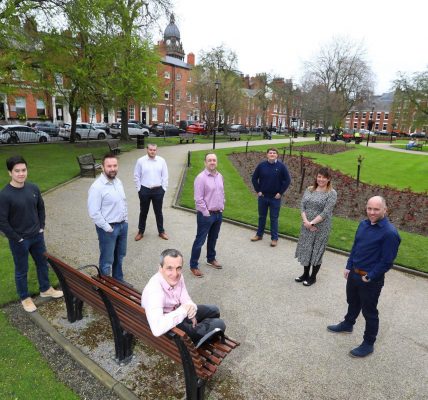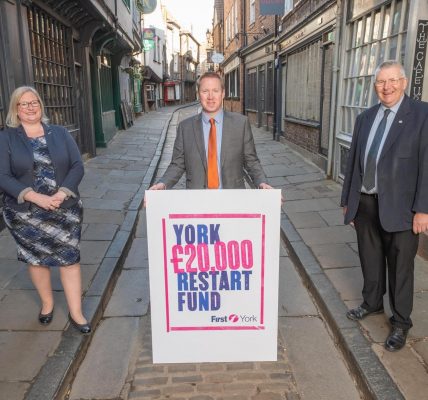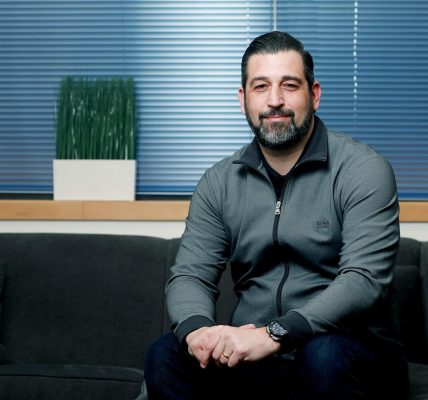Profile: the ‘analogue maverick living in a digital world’
Mark Fordyce is what might be called an early adopter. He appears to have a canny knack of getting in on trends early and making good. Now managing director of York Data Services, he was one of the region’s internet pioneers and helped make his home city of York the UK’s first ‘gigabit city’, giving it the best bandwidth in the country.
He is also, according to his Twitter bio, an “analogue maverick in a digital world”.
“That’s a nod towards my past,” he says. “My life outside of tech is synthesisers, old analogue machines; I have quite a significant collection of those that are in use.”
The past he refers to seems almost like a previous life, so far removed is it from his current day-to-day. In the early 1980s he caught the latest cultural wave and formed an electronica band called The Mood, which was signed to RCA and enjoyed some times that were so good that he prefers not to go into the details.
“Being signed to a major record label in the early 80s, and spending a lot of time with Spandau Ballet, Duran Duran, Culture Club – and all those kinds of bands that were happening at a time when there was a massive explosion – was probably the most exciting time to be involved in the music industry,” he says.
“It was an amazing life, an amazing lifestyle to be involved with.”
It was also to prove to be the key to his later incarnation as a tech entrepreneur. He spent time with Trevor Horn, one of the pioneering producers of the day, and cut his teeth using some ground-breaking new technology.
“I was very fortunate to be around Trevor in those early years and seeing all the stuff he was doing and getting to play on his toys. That was a real eye-opener for me and it became a real passion.
“Recording studios back then were early adopters of computers. Especially things like Apple computers were seen quite often in recording studios for sequencing and things, so I was exposed to that technology way back when it first emerged in the late 80s, early 90s.”
Once the band had split and he had to find a new outlet for his energies, he formed an internet company, gained investment from Greenwich Capital in London, and started building internet networks in the Square Mile.
Yet despite the change of setting, he didn’t need a personality transplant; he had transferable skills, both soft and hard.
“My biggest strength is being a creative – never take no for an answer, there’s always another way to do something,” he says.
“Everything I’ve done has been born out of that, born out of curiosity. I think going to London, and that opportunity with the dotcom side of things in the late 90s, with the whole internet just emerging, I looked at it and saw it in a different way and realised the power that it really could be.
“I got involved with networking from a very creative angle, and that’s what I’ve utilised ever since.
“We love looking at problems and creating new solutions around something that others may find to be problematic. We find a way round.”
His work also took him to New York, where he helped build the world’s first spread-betting network for Cantor Fitzgerald, the broking giant that lost 658 employees in the 9/11 terrorist attacks.
“I left about six months before 9/11, and one of the last things I did before I left was test one of the new products on the trading floor at the World Trade Center.
“I’ve still got a testing sheet and of the 54 people [named on it], the brokers that helped stress-test our platform, none came home that day. It makes you think, doesn’t it?”
There were to be more challenges along the way, as there are in business, but Mr Fordyce says that his grounding in the music industry helped him develop a resilience that would keep him and his company on track.
“When you grow up in the music industry, you have to be prepared to be knocked down,” he says.
“Those early years are full of rejections. When you’re taking your cassette tape round to companies, you have to be prepared for the many knock-backs and the ones who say no. But you keep going forward until you find the one who says yes.
“When I first set out on a course that I was going to be in a band and I was going to be successful, nothing would take me off that course, nothing would stop me. It’s the same now. You have to have the power of belief.”
It looks very much as though that self-possession – which he credits his father for – is about to see York Data Services go through a period of rapid expansion. It currently has a sizeable client base, but it is heavily weighted towards the North, and Mr Fordyce plans to push up into Scotland and south towards London, making the company truly national.
The business is currently recruiting another six employees, and Mr Fordyce reckons it will triple in size over the next three years.
“We’ve been able to fine-tune our internal processes and the way we deliver our products through lockdown,” he says.
“So we’re just about to put the foot on the pedal now, and that model is scalable. So that’s the next chapter of the story for York Data Services – we’re just about to push the accelerator.”
In the meantime, he’s still making music – he’s currently looking at co-writing with some ex-members of Kraftwerk – and would like to do something digital to solve the music industry’s remuneration crisis caused by online streaming; “artists ultimately have to be able to sustain themselves,” he says.
The theme that connects it all, he believes, is what he’s done that will outlast him.
“There’s a legacy in this stuff that I did musically, in the band,” he says.
“With York Data Services, there is a legacy attached to the infrastructure that we’re building, and the part we’re playing.
“Helping to build a northern internet exchange – a not-for-profit organisation for the benefit of the community: that’s legacy. Those are the things that are real motivators to keep me going.”
Born in Edinburgh, Mark Fordyce moved with his family to York as a teenager in 1979.
Soon after, he formed a band called The Mood, which was signed to major record label RCA in 1981.
The band split up in 1984, and Mark went on to form an internet company which received financial backing and some major contracts, not least working with broker Cantor Fitzgerald in New York.
He founded York Data Services in 2003.
He is a co-founder of IXLeeds, a neutral not-for-profit Internet Exchange Point.
He is a member of the board of Science City York, the governing board of York St John’s University, and the board of Make It York.
Now a grandfather, he still lives in York, and still makes music.










